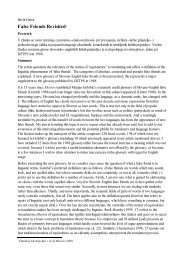definitions of occupational therapy wfot glossary - Lexicool
definitions of occupational therapy wfot glossary - Lexicool
definitions of occupational therapy wfot glossary - Lexicool
You also want an ePaper? Increase the reach of your titles
YUMPU automatically turns print PDFs into web optimized ePapers that Google loves.
Definition and Function <strong>of</strong><br />
Occupational Therapy<br />
Occupational Therapy is a health discipline which is concerned with people<br />
who are physically and/or mentally impaired, disabled and/or handicapped,<br />
either temporarily or permanently. The pr<strong>of</strong>essionally qualified <strong>occupational</strong><br />
therapist involves the patients in activities designed to promote the restoration<br />
and maximum use <strong>of</strong> function with the aim <strong>of</strong> helping such people to meet<br />
the demands <strong>of</strong> their working, social, personal and domestic environment,<br />
and to participate in life in its fullest sense.<br />
Occupational <strong>therapy</strong> may be indicated for any or all <strong>of</strong> the following:<br />
• to assist in maintaining maximum well being<br />
• to prevent deterioration <strong>of</strong> a chronic disorder<br />
• to assist in diagnosis<br />
• to promote and restore biopsychosocial functions<br />
• to hasten convalescence<br />
• to restore work capacity<br />
• to promote social adjustment and integration<br />
• to test the stability <strong>of</strong> recovery<br />
Procedures selected are related to each patient´s needs. In every case<br />
observation, analysis and recording are an essential part <strong>of</strong> the <strong>occupational</strong><br />
therapist´s function. Success in treatment depends largely on the individual<br />
and group relationships involved, and the effort which each patient can be<br />
encouraged to make towards his/her recovery.<br />
Occupational <strong>therapy</strong> programmes are part <strong>of</strong> the health care services in<br />
hospitals, (treating physical and/or psychiatric disorders), day hospitals,<br />
rehabilitation centres, geriatric institutions, home care programmes, special<br />
schools and clinics, reform institutions, home care and community<br />
programmes and other organizations which provide rehabilitation and/or<br />
preventive services, both within and outside the medical model. The<br />
<strong>occupational</strong> therapist contributes to the total rehabilitation <strong>of</strong> the patient in<br />
conjunction with other members <strong>of</strong> the treatment team.<br />
1993<br />
1













